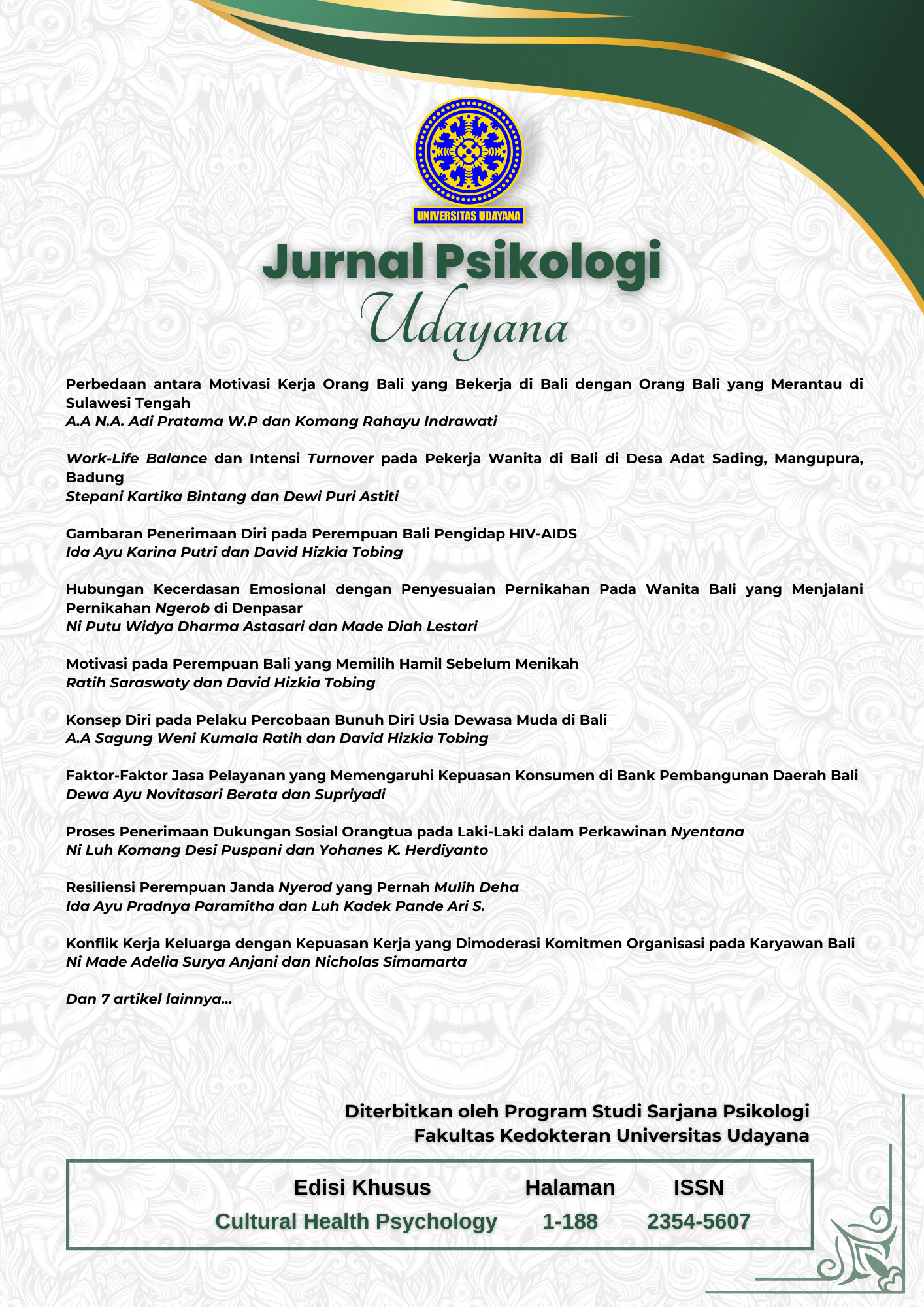PERBEDAAN SUBJECTIVE WELL-BEING PADA PEREMPUAN BALI YANG MENIKAH SESAMA WANGSA DAN BERBEDA WANGSA
Abstract
Subjective wellbeing is a thorough assessment of the individual's life that involves cognitive and affective aspects. The cognitive aspect is reflected in the assessment of life satisfaction and affective aspect is reflected from the positive and negative affects felt by the individual, the happiness of individual is when positives affect more dominant than the negatives affect. Marriage is one of the most powerful predictors of subjective wellbeing . In the collective culture, happiness can be caused by social acceptance of their marital status. Wangsa is a social stratification system in Balinese society that divides people into specific groups based on lineage. Wangsa system affects the process and marriage system in Bali which resulted in the emergence of same and different wangsa marriages. Same wangsa marriage will be easier to obtain the consent of the parents marriage more than different wangsa marriage, as well as their social consequences that must be faced by a woman who married different wangsa. In modern times the implementation of wangsa system have been improper, and some rules related to different wangsa married have been more flexible compared to the ancient times. This study aimed to see the condition of subjective wellbeing in Balinese women who married the same and different wangsa. This study used quantitative methods. The sampling technique in this study was three-stage cluster random sampling. Total sample of 60 people, consisting of 30 Balinese women who married the same wangsa and 30 Balinese women married the different wangsa. Measure tool used was subjective wellbeing scale. Data analysis method used was independent sample t-test. The study stated that there was no difference of subjective wellbeing in Balinese women who married the same and different wangsa.
Keyword: subjective wellbeing , balinese women, same wangsa married, defferent wangsa married.
Downloads
References
Azwar, S. (2013). Dasar-Dasar Psikometri. Yogjakarta: Pustaka Pelajar.
Compton, W. C. (2005). Introduction to Positive Psychology. USA: Thomson Learning.
Cunningham, M.R. (1988). Does Happiness Mean Friendliness? Induced Mood And Heterosexual Self-Disclosure. Personality and Social Psychology Bulletin.14. .283–297.
Diantha, M. P., Wisanjaya, I. G. P. E. (2010). Kasta Dalam Perspektif Hukum dan HAM. Denpasar: Udayana University Press.
Diener, E. (2009a). The Sience of Wellbeing : Collected Work of Ed Diener. USA: Springer Science + Business Media.
Diener, E. (2009b). Assesing Wellbeing : Collected Work of Ed Diener. USA: Springer Science + Business Media.
Diener, E., Kesebir, P., Lucas, R. (2008). Benefits Of Account Of Wellbeing For Societies And For Psychological Science. Applied Psychologi: An Internatinal Review.57. 37-53. Doi: 10.1111/j.1464-0597.2008.00353.
Diener, E., Nickerson, C., Lucas, R.E., & Sandvik, E. (2002). Dispositional affect and job outcomes. Social Indicators Research.59 . 229–259.
Gillum, T. L., Sullivan, C. M., & Byebee, D.I. (2006). The Importance Of Spirituality In The Lives Of Domestic Violence Survivors. Violence Against Women, 12 (3), 240-250.
Kerepun, M. K. (2007). Mengurai Benang Kusut Kasta: Membedah Kiat Pengajengan Kasta di Bali. Denpasar: PT Emapat Warna komunikasi.
Nazir, M. (1988). Metode Penelitian. Jakarta: Ghalia Indonesia.
Nurgiyantoro, Burhan, Gunawan & Marzuki (2009). Statistik Terapan untuk Penelitian Ilmu-ilmu Sosial. Yogjakarta : Gadjah Mada University Press.
Papalia, D. E., Old, S.W. & Feldman, R.D. (2011). Human Development (Psikologi Perkembangan: A.K. Anwar). Jakarta : Kencana.
Putra, I P. G. D. Wiraswasti, A.A. K.S., Herdiyanto,Y.K. & Tobing, D.H. (2014). What makes Balinese Women With Nyerod Marriage Happy? : An Indigenous Psychological Approach. Center For Health and Indigenous Psychology: Universitas Udayana.
Rohmad, Pratisti, W.D. 2015. Dukungan Sosial Dan Kesejahteraan Subjektif Mahasiswa Fakultas Psikologi Universitas Muhammadiyah Surakarta. Proceedings Seminar Nasional tentang Selamatkan Generasi Bangsa dengan Membentuk Karakter Berbasis Kearifan Lokal. Surakarta: Universitas Muhammadiyah Surakarta. 219-227.
Santoso, S. 2003. Mengatsi Berbagai Masalah Statistik dengan SPSS Versi 11.5. Jakarta: PT Elex Media Komputindo.
Sarafino, E.P., Simth, T.W. 2011. Health Psychology: Biopsychosocial Interactions Seventh Edition. USA: John Wiley & Sons Inc.
Snyder, C.R., Lopez,J.S. (2005). Handbook of Positive Psychology. USA: Oxford University Press.
Subardini, N.N. (2011). Starafikasi Masyarakatat Bali Dalam Tarian Bumi dan Kenanga Karya Oka Rusmini. Jakarta: Badan pengembangan dan Pembinaan Bahasa, Kementrian Pendidikan Nasional.
Vratasti, I G. A. M. (2015). Kebahagiaan Perempuan Bali yang Menikah Sesama Wangsa dan Berbeda Wangsa. (Studi Pendahuluan Tidak Diterbitkan). Program Studi Psikologi, Fakultas Kedokteran. Universitas Udayana, Bali.
Wiana,K. & Santeri, R.. (2006). Kasta dalam Hidup Kesalahanpahaman Berabad-abad. Denpasar: Yayasan Dharma Naradha.
Windia, W.P., Sudantra, I K., Komalasari, G. A. K., Suartika, I G., Dyatmikawati, P., Pemanyun, C. I. A., Suantina, M., Windia, I K., Dewi, A.A. I. A. A., Sadnyini, I. A., Paraniti, A.A. S. P. & Andayani, I D. A. Y. (2012). Perkawinan Pada Gelahang di Bali. Denpasar : Udayana University Press.
Wiraswasti, A.A. K.S., Putra, I P. G. D., Herdiyanto,Y.K. & Tobing, D.H. (2014). The Self Estem Dynamics of Balinese Women Who Lived in Nyerod Marriage. Center For Health and Indigenous Psychology: Universitas Udayana.
Authors who publish with this journal agree to the following terms:
- Authors retain copyright and grant the journal right of first publication with the work simultaneously licensed under a Creative Commons Attribution-ShareAlike 4.0 International License that allows others to share the work with an acknowledgement of the works authorship and initial publication in this journal.
- Authors are able to enter into separate, additional contractual arrangements for the non-exclusive distribution of the journals published version of the work (e.g., post it to an institutional repository or publish it in a book), with an acknowledgement of its initial publication in this journal.
- Authors are permitted and encouraged to post their work online (e.g., in institutional repositories or on their website) prior to and during the submission process, as it can lead to productive exchanges, as well as earlier and greater citation of published work (See The Effect of Open Access).













